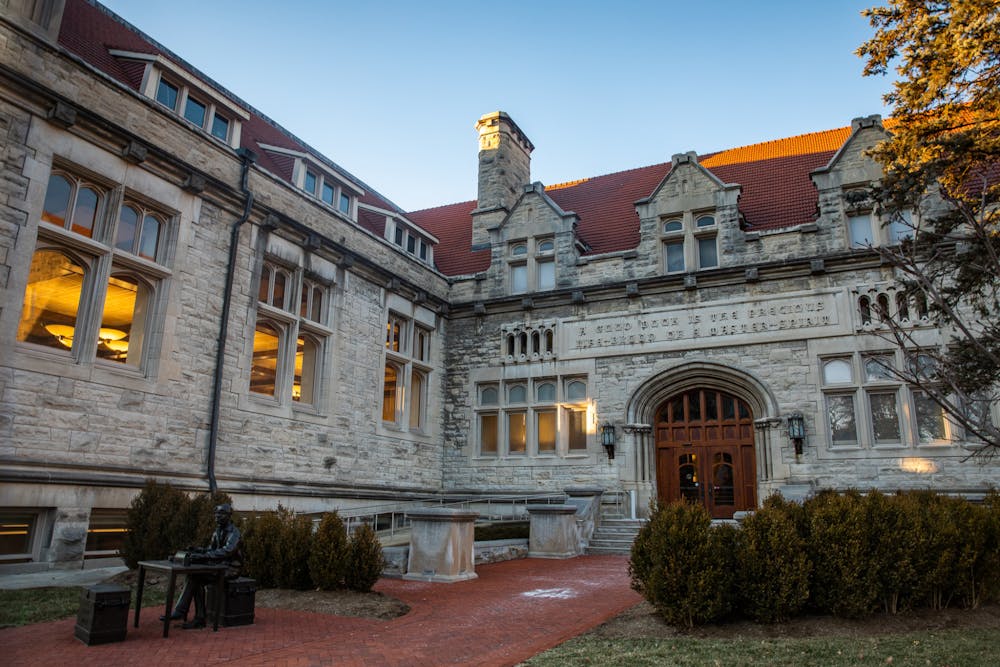The Media School held a listening session on safety and security Thursday morning in Franklin Hall.
Several Media School staff and faculty were in attendance including Galen Calvio, director of undergraduate studies at the Media School, Radhika Parameswaran, associate dean at the Media School, and Jay Kincaid, director of facilities and technology at the Media School.
Excluding members of student media, no undergraduate students attended the listening session.
After introducing the panelists and Media School staff and faculty, Parameswaran discussed the changes that have been made after the police responded to three incidents in and around Franklin Hall from Aug. 30 to Sept. 5.
[Related: Franklin Hall addresses security concerns after multiple harassment incidents]
Since these incidents took place, Parameswaran said the exterior side doors of Franklin Hall have been locked and only accessible by Crimson Card, making the front door the only publicly accessible entry point of the building. The Media School, she said, also increased the presence of IUPD cadets in the building and digital and physical signage encouraging students, staff, faculty and others to call 911 if they see any issues or problems.
Old-fashioned posters on easels announcing the same message were created to cut through the digital saturation students sometimes experience, Parameswaran said.
Parameswaran said The Media School is in the process of updating courses’ syllabi language to include security resources. She also added information for students about 988, the number to reach the suicide and crisis lifeline in Indiana.
She said it was surprising the Office of the Vice Provost for Faculty and Academic Affairs, which helps faculty with syllabus language, didn’t include any official syllabus guidance on safety and security.
“They were very happy to get our language, right, but they want to go through it a little more carefully,” Parameswaran said. “I have a feeling it's good to be added to the long list of campus language.”
Benjamin Hunter, associate vice president and superintendent for public safety at IU, said safety and security are a shared responsibility. IU Public Safety, he said, uses three methods to primarily communicate security and safety concerns, such as IU Notify. He said the use of these methods are guided by the Jeanne Cleary Act.
Colleges and universities are required to report campus crime data, support victims of violence and publicly outline the policies and procedures put in place to improve campus safety under the Cleary Act, according to the Cleary Center.
Once IU Public Safety sends an IU notify alert, Hunter said an incident management team — which includes IUPD, emergency management and physical security — is immediately assembled.
“It can be anywhere from the person that was in the storm drain to a bomb threat,” Hunter said.
[Related: IU addressing unlocked doors, Crimson Card issues following new security measures]
Additionally, Hunter said, IU Public Safety has crime notices, which fall under the Cleary Act, and public safety advisories, which are used to share information IU Public Safety thinks the community should know but does not necessarily fall under the Cleary Act.
One example of these types of safety concerns, Hunter said, were air quality issues on the IU East Campus due to a fire at a tire factory. He said IU Public Safety shut the campus down and, while it wasn’t related to the Cleary Act, it was something IU Public Safety wanted to let people know about it.
Hunter said IU Public Safety generates crime notices when they perceive a trend or pattern it considers an on-going and continuous threat. He said there is an IU Public Safety team that looks at the pattern and those events are flagged on all IU campuses. When the pattern reaches a certain threshold, then IU Public Safety issues a crime notice.
When the Bloomington Police Department arrested a man with a knife on IU’s campus on Aug. 30, Hunter said people questioned why IU Public Safety decided to not send out an IU notify alert. By the time IUPD was notified, Hunter said, they had dispatched officers, and the man was already in custody, so the threshold of an on-going threat wasn’t met.
He said IU notify alerts are intended for situations when people should take action, like sheltering in place.
Hunter also said there hasn’t been any increase in the occurrence of incidents in IU campus buildings since Sept. 5 despite incidents that have drawn public attention. Additionally, he said he wants students to know IU Public Safety is putting additional security measures in place and encourages them to call IU Public Safety if a student is feeling uneasy.
“It's a balance, but we don't want anybody -- faculty, staff or students -- to feel uneasy,” Hunter said, “If there's a method or a mechanism that we can get better at work with faculty, staff and students --that's why we're having these meetings to say, ‘What's the right balance?’”
This semester, IUPD Deputy and Superintendent Brad Seifers said IUPD has focused on increasing the number of visible patrols on campus.
“We're borrowing from other agencies and universities that are doing these types of things to be more community oriented.” Seifers said.
Going forward, Hunter said patrols known as “old campus patrol” have been told to focus on Sample Gates, Bryan Hall, the Maurer School of Law and Franklin Hall to be visible.
Additionally, Leslie Slone, assistant director of safety and security at IU Public Safety and Kincaid conducted a full security review of Franklin Hall, Audrie Osterman, director of communications and marketing at the Media School, said.
Slone, Osterman said, will write a report with security recommendations and give it to the Media School in a few weeks.
Part of the listening session’s purpose, Osterman said, was to hear the people’s recommendations, and Slone heard some from faculty and staff. This session was the third of three sessions, the previous two were for graduate students, faculty and staff.
[Related: Mayor Hamilton proposes sending more civilian responders on 911 calls]




